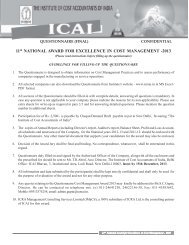This Issue - Icwai
This Issue - Icwai
This Issue - Icwai
Create successful ePaper yourself
Turn your PDF publications into a flip-book with our unique Google optimized e-Paper software.
LEGAL LEGAL EDUCATION<br />
EDUCATION<br />
Legal Education in India—How far the<br />
Second Generation Reforms will meet the<br />
Global Challenges<br />
Since the Vedic times, dispensation of justice has<br />
been considered a sacred ‘Dharma’. Such<br />
dispenser of Justice, the King or any of his<br />
nominee, used to be one considered infallible—the<br />
integrity personified.<br />
The Regulation Act, 1772, recognized for the first<br />
time the legal profession in India. Thereafter, it was<br />
codified in Bengal Regulation VII of 1793, prescribing<br />
the scales of fee to be charged by the Vakils. It was<br />
further modified by the Legal Practitioners Act, 1846,<br />
as a subject to regulate both the Vakils and Barristers.<br />
The Legal Practitioners Act, 1853 and 1879, made<br />
suitable amendments. The Bar Council Act, 1926, was<br />
passed to unify the Bar in India and to give the legal<br />
profession measured autonomy in its affairs wherein<br />
the State Bar Councils and the High Courts were<br />
authorised to regulate the admission and the conduct<br />
of the Advocates practicing in the Courts.<br />
Rule of law became a fundamental doctrine for<br />
governance of country with the adoption of the<br />
Constitution in the post-independence era. Consequently<br />
arose the need to streamline the legal education<br />
in the country and, finally, the Advocates Act, 1961,<br />
replaced the pre-existing laws and gave autonomy to<br />
the Bar Council of India and the Bar Councils of the<br />
States. Under the Act, one of the many functions of the<br />
Bar Council of India is to promote legal education and<br />
lay down standards of such education in consultation<br />
with the Universities imparting such education, and the<br />
Bar Councils of the States. It is also required to maintain<br />
high standards in legal profession and discipline the<br />
Advocates.<br />
Section 7 (1) (h) requires the BCI to “consult the<br />
universities for the purpose of laying down these<br />
standards of legal education”. Section 7(1) (i) of the<br />
Act enables the BCI to grant recognition to universities<br />
whose law degrees shall be sufficient qualification for<br />
enrolment as an advocate. The BCI may, for this<br />
purpose, visit and inspect the universities concerned<br />
whose degrees in law may be recognized for the<br />
purpose of enrolment of law graduates as lawyers.<br />
Similar power is conferred by Section 6(1) (gg) of the<br />
Act on the State Bar Councils in regard to inspection.<br />
Section A of Part IV of the Rules made by the BCI<br />
deals with the five years’ course, Section B deals with<br />
the three years’ course and Section C deals with<br />
inspection. However, in practice, it may not be<br />
* LLB, FCS, FICWA<br />
K P C Rao*<br />
possible for the BCI to consult each and every<br />
University and there is no manner prescribed in the<br />
Advocates Act, 1961, for rendering effective<br />
consultation in this regard.<br />
Today, legal education has to meet not only the<br />
requirements of the Bar and the new needs of trade,<br />
commerce and industry but also the requirements of<br />
globalization. New subjects with international<br />
dimensions have come into legal education. There is<br />
also an enormous need for non-practising law<br />
graduates in trade and commerce. It is also necessary<br />
to allow engineers, Company Secretaries, Chartered<br />
Accountants, scientists and doctors to qualify in law<br />
for non-practising purposes. Indeed, it is gratifying<br />
that some Indian Institute of Technology (“IIT”)<br />
institutions have recently started several courses in<br />
law. The Open University system must also be<br />
allowed to cater to legal education. The Bar Council<br />
of India may, of course, still deal with the minimum<br />
standards of legal education for the purposes of entry<br />
into the Bar but there is a need to have a new regulatory<br />
mechanism that will cater to the aforementioned<br />
present and future needs of the country.<br />
Paradigm shift in conceptual thanking<br />
India currently faces the major challenges in the<br />
field of providing legal education to respond to global<br />
challenges. Although India has emerged as a leading<br />
global hub for the knowledge based service industry<br />
for the past decade, it still needs a revolution to meet<br />
and respond to global challenges in providing<br />
services—particularly by the lawyers, whether in<br />
litigation or non-litigation side.<br />
At present, professional legal education is being<br />
imparted by 913 colleges recognised by the Bar<br />
Council of India and 14 National Law Universities/<br />
Schools established under the State Acts. The Bar<br />
Council of India, under the Advocates Act, 1961, has<br />
made rules to regulate legal education but the<br />
standard of legal education does not meet the present<br />
day requirements of the legal profession. The matter<br />
relating to the legal education has been examined by<br />
the Law Commission of India in its 184th Report on<br />
Legal Education and Professional Training and<br />
Proposals for Amendments to the Advocates Act,<br />
1961, and the UGC Act, 1956 (2002). Earlier, Supreme<br />
The Management Accountant |September 2011 793




